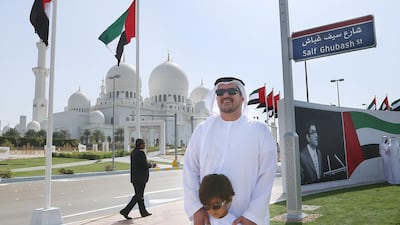ABU DHABI // A generation of Emiratis who knew Saif Ghubash, the government minister assassinated in 1977, say that naming a street in his honour will encourage interest in his achievements.
“Saif Ghubash was a man of determination,” said Faisal Al Teniji (Ras Al Khaimah), a Federal National Council member who hails from the same home town.
Although he did not know Mr Ghubash, who was murdered at the age of 45 on October 25, 1977, at Abu Dhabi International Airport, Mr Al Teniji is well aware of the late minister’s life history, and is a friend of his two eldest sons, Adnan and Omar.
The older generation of locals know of Mr Ghubash’s life story but the younger people only know about the assassination, according to Mr Al Teniji.
Mr Ghubash was known for his quest for knowledge. He gained experience from his travels, and returned to the UAE to help develop the country.
After his parents died, Mr Ghubash, who was then 12 years of age, moved to Dubai to live with his aunt. He enrolled in Al Ahmedi school and studied English at night classes.
In the autumn of 1949 when he was 17, Mr Ghubash travelled to Bahrain to continue his education.
After finishing secondary school with the highest grades in his class, he enrolled in Baghdad University in Iraq, where he studied engineering. His education was, however, interrupted two years later because of political instability in the country.
After leaving Iraq in 1956 at the age of 24, he went to Egypt where he landed a scholarship and travelled to Kuwait to work as an assistant engineer.
When he was 27, Mr Ghubash flew to Austria to study German. He later moved to Germany and several other European countries, working as an assistant engineer and studying languages.
After 20 years away from home, he moved to Ras Al Khaimah in 1969, before the UAE’s federation in 1971. From then on, his short but influential political career started.
“Saif Ghubash is very well known for his time in politics,” said Mr Al Teniji. “He came back and gave so much to his country.”
After working in Ras Al Khaimah with Sheikh Saqr Al Qassemi, Mr Ghubash joined the civil service.
In 1971, at the age of 39, he went to Cairo with a UAE delegation to seek help from the Arab League following Iran’s invasion of three UAE islands.
Soon after he became an undersecretary of the Ministry of Foreign Affairs, where he worked to build the ministry and prepare UAE nationals for ambassadorships abroad. He taught them not to overreact or be overtaken by their emotions.
Two years later, he was named the first minister of state for foreign affairs, and became the official spokesman for the UAE.
On October 25, 1977, Mr Ghubash, who had worked for the Government for six years, accompanied Abdel-Halim Khadim, Syria’s then foreign minister, to the Abu Dhabi International airport.
When they entered the airport’s hall, a shot rang out. The Syrian minister was the target, but Mr Ghubash became the assassin’s victim. He was shot in his arm and stomach, and died at hospital.
Although Mr Ghubash’s memory is kept alive in Ras Al Khaimah where a hospital was named after him, a new street near the Sheikh Zayed Grand Mosque in Abu Dhabi would “preserve his existence for ever”, said Mr Al Teniji.
“Now that a road is named after him, people will want to research and know more about his history,” he said.
Abdulaziz Al Zaabi, a fellow FNC member from Ras Al Khaimah, said: “The role he played is part of the country’s history, one that people should know of.
“He was known for standing up for the UAE worldwide, and for the Arab and Muslim world.
“I am very happy that the President, Sheikh Khalifa, gave the orders for a road to be named after him.”
During the unveiling of a sign displaying Mr Ghubash’s portrait and his name on the road, his son, Omar Saif Ghubash, said his late father was “an example to us”.
“We have inherited his legacy to follow on the same path to carry out the UAE’s message and to represent it in the best way, based on its wise leadership’s vision in tying friendship and cooperation with world countries and spreading a message of love, peace, and goodwill to all,” said the UAE ambassador to Moscow.
osalem@thenational.ae

